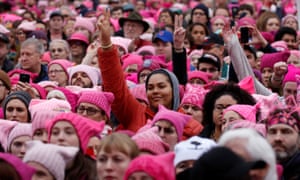Feminism has been named word of the year by the American dictionary Merriam-Webster.
The US dictionary said that it had seen a 70% increase in online searches for the word in 2017, compared to 2016. The largest spike in searches came in the last weeks of January, following the Women’s March in Washington DC and around the world.
Searches spiked again in late February, when US president Donald Trump’s spokesperson Kellyanne Conway said at a conservative conference that she didn’t consider herself a feminist “in the classic sense because it seems to be very anti-male and it certainly is very pro-abortion, in this context”, and once more as following the revelations about Harvey Weinstein’s alleged sexual harassment of women in Hollywood triggered other accounts of assault to mushroom.
Merriam-Webster defines feminism as “the theory of the political, economic, and social equality of the sexes” and “organised activity on behalf of women’s rights and interests.” It said the word was first entered in an English dictionary in 1841, by Noah Webster, when it was defined simply as “the qualities of females”.
“No one word can ever encapsulate all the news, events, or stories of a given year—particularly a year with so much news and so many stories. But when a single word is looked up in great volume, and also stands out as one associated with several different important stories, we can learn something about ourselves through the prism of vocabulary,” said the dictionary. “Interest in the dictionary definition of feminism was also driven by entertainment this year: we saw increased lookups after the release of both Hulu’s series The Handmaid’s Tale and the Wonder Woman film, starring Gal Gadot.”
Other contenders for the top spot at Merriam-Webster included “complicit”, which saw a spike in online searches when the president’s daughter Ivanka Trump was asked on television whether she and her husband, presidential adviser Jared Kushner, were “complicit” in what was happening in the White House. She responded that she didn’t know “what it means to be ‘complicit’”: the dictionary defines the word as “helping to commit a crime or do wrong in some way”. Complicit was also chosen as word of the year by Dictionary.com earlier this month, with the online dictionary citing a 300% increase in searches year-on-year.
Merriam-Webster said that “recuse”, meaning “to disqualify (oneself) as judge in a particular case” was also in contention for its word of the year slot, thanks to US attorney general Jeff Sessions recusing himself from the FBI’s investigation in March. As was “dotard”: defined by the dictionary as “a person in his or her dotage”, dotage meaning “a state or period of senile decay marked by decline of mental poise and alertness”, the word saw a 35,000% increase in searches year-on-year, after North Korean president Kim Jong-un called Donald Trump “a mentally deranged US dotard”.

